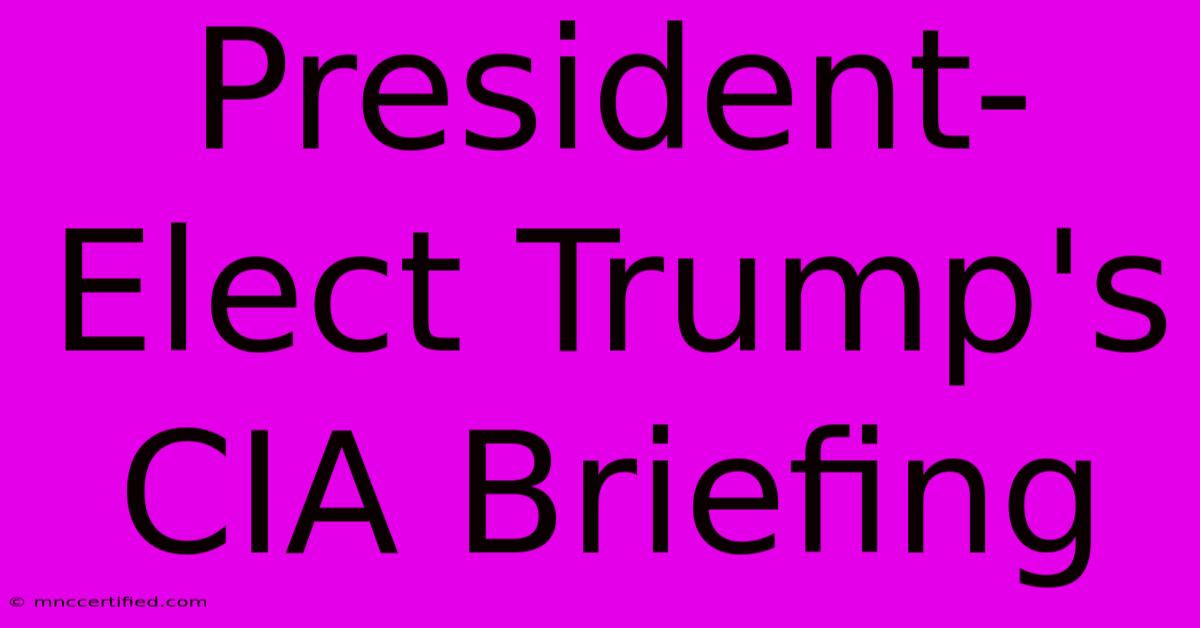President-Elect Trump's CIA Briefing

Table of Contents
President-Elect Trump's CIA Briefing: A Deep Dive into the Intelligence Presented
The intelligence briefing given to President-Elect Donald Trump in November 2016 remains a subject of significant interest and ongoing debate. This article delves into the details of that briefing, exploring its content, the context surrounding it, and its lasting impact on the early days of the Trump administration.
The Context: A Highly Anticipated Briefing
The meeting, held at CIA headquarters, was highly anticipated for several reasons. Trump, a political outsider with no prior government experience, was about to assume the presidency at a time of significant global uncertainty. The briefing aimed to provide him with a comprehensive overview of the most pressing national security challenges facing the United States. Key areas of concern included:
- Russia's interference in the US election: This was arguably the most sensitive and controversial topic. Allegations of Russian meddling were already swirling, creating a politically charged atmosphere.
- ISIS and global terrorism: The ongoing threat of ISIS and other terrorist organizations remained a top priority for the incoming administration.
- Cybersecurity threats: The increasing sophistication and frequency of cyberattacks posed a serious national security risk.
- Iran's nuclear program: The Iran nuclear deal, a key foreign policy achievement of the Obama administration, was a subject of intense debate.
- North Korea's nuclear ambitions: North Korea's continued pursuit of nuclear weapons presented a growing threat to regional stability.
The Content of the Briefing: What Was Discussed?
While the precise details of the briefing remain classified, reports suggest it covered a wide range of intelligence assessments. It's understood that the briefing included:
- A detailed assessment of Russian interference in the 2016 election: This likely included evidence of hacking, disinformation campaigns, and attempts to influence the outcome of the election.
- An overview of the global terrorist threat: This would have included assessments of ISIS capabilities, regional conflicts, and potential terrorist attacks.
- Briefings on cyber warfare and espionage: This could have covered threats from state-sponsored actors as well as non-state actors.
- Analysis of ongoing geopolitical crises: This would have encompassed various hotspots around the world, including the Middle East and East Asia.
It's important to note that the exact nature and depth of the information presented remain unclear due to the classified nature of the briefing. News reports at the time often offered conflicting accounts, further adding to the intrigue surrounding the event.
The Reactions and Aftermath
President-Elect Trump's reaction to the briefing generated considerable controversy. While he reportedly received the information seriously, his subsequent public statements and actions concerning Russia and the intelligence community fuelled intense debate and speculation. This period set the stage for many of the challenges faced during his early presidency.
Long-Term Implications and SEO Considerations
The President-Elect Trump's CIA briefing remains a significant event in modern US political history. Its lasting implications include shaping the early narrative of his presidency, influencing his foreign policy decisions, and contributing to ongoing discussions about the relationship between the intelligence community and the executive branch.
For SEO purposes, this article incorporates several relevant keywords and phrases, including:
- President-Elect Trump
- CIA briefing
- Russian interference
- 2016 election
- National security
- Intelligence community
- Global terrorism
- Cybersecurity
- Iran nuclear deal
- North Korea
By utilizing these keywords naturally within the context of the article, we aim to improve its search engine ranking and visibility. Remember to continue updating and expanding on this topic as new information emerges to maintain relevance and attract more readers. Effective SEO requires consistent monitoring and adaptation.

Thank you for visiting our website wich cover about President-Elect Trump's CIA Briefing. We hope the information provided has been useful to you. Feel free to contact us if you have any questions or need further assistance. See you next time and dont miss to bookmark.
Featured Posts
-
Does A Car Wrap Affect Insurance
Nov 22, 2024
-
Temporary Bobtail Insurance Cost
Nov 22, 2024
-
Farmers Insurance Open Golf 2017
Nov 22, 2024
-
Snowflake Q3 Earnings Revenue Surpasses Expectations
Nov 22, 2024
-
Estrella Insurance In Orlando Fl
Nov 22, 2024